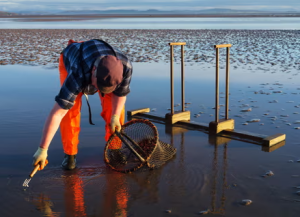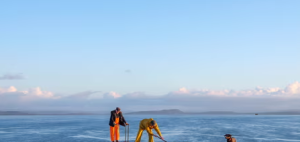A massive metal gate that spans the entrance to the sands outside the fishing community of Flookburgh, Cumbria, has a prohibition notice that reads, “Beach closed to cockle fishing.” Up to April 2024, it is illegal to remove cockles, and doing so might result in a punishment of up to £10,000.
After jumping out of his white van to open the gate, Michael Wilson drives past a few trailers used for shrimp farming and onto the edge of Morecambe Bay, which covers an area of 120 sq miles and is home to the nation’s largest intertidal mudflats and sands.
Pointing across the sands to the Heysham nuclear power station, six miles south, he declares, “This is the cockling way out.” “To avoid the tide, we would have left at first light if we were leaving now.”
It can take an hour to drive a tractor across the dunes to the cockle beds, he continues, taking “the long way” to avoid its infamous channels and gullies.
The North Western Inshore Fisheries and Conservation Authority (Ifca) has blocked the main Morecambe Bay cockle bed at Flookburgh for a number of years due to low biomass of sized cockles found in several surveys. The most recent survey, conducted in 2023, revealed a low number of large, or mature, animals and a significant percentage of undersized ones. If the cockles develop, Ifca intends to open it later this year.

Even seasoned fishermen like Wilson, 51, who learnt the job from his father as a child, find the large, shallow bay of Morecambe perilous due to its dynamic character, rapid tidal surges, shifting channels, and high tides that can exceed nine knots.
For decades, Flookburgh fishermen have harvested cockles, mussels, prawns and other shellfish by hand. As a result, they have ‘an interactive map’ of the tides, weather and flowing channels stored in their minds.
Twenty years ago, on February 5, 2004, a strong spring tidal killed twenty-three Chinese migrants who were picking cockles in the dark in the waters off Hest Bank.
Engaging
The victims, who ranged in age from 18 to 45 and some of them had only been in the country for a few months and did not understand English, had been tricked into coming to the UK by gangsters who had taken advantage of them. They were eventually imprisoned after being found guilty of manslaughter.
The incident stunned the country and revealed the sinister side of Britain’s “wild west” cockle industry. Strict laws were enacted to stop labour exploitation, such as the creation of the Gangmasters Licencing Authority (which subsequently changed its name to the Gangmasters and Labour Abuse Authority).
At an event on Sunday at Morecambe’s West End beach, lanterns will be lit as a sign of respect for those who have passed away.

However, Gary Parsons, the station officer at Flookburgh’s Bay Search & Rescue, claims that it was a free for all as late as 2009. Approximately 800 to 900 individuals arrived at the beds that year, travelling kilometres on the sands in vehicles, trailers, and tractors in preparation for the harvest. They came from all across the UK and outside.
The former seafish authorities have been replaced by Ifca, which has strict supervision over the trade. It manages a permit system, keeps an eye on the bay, and closes it when the cockles are undersized or insufficiently numerous, after consulting with a commission made up of fishermen.
Although the local fishermen celebrate the end of the wild west days and acknowledge the necessity for regulation to prevent disasters like the one that occurred 20 years ago, they claim the limitations are hurting them. They caution that the laws run the risk of eradicating a multigenerational fishing legacy because their children and grandkids are not granted preference when applying for a prized cockle licence.
Most of the fisherman in Flookburgh are older than fifty, according to Wilson, whose 76-year-old father John used to assist him until he suffered a hip fracture. “Many are unable to go out anymore.”
A triple heart bypass, cancer, and back problems have affected the elderly members of multiple fishing families in the area, including one who is 67 years old. All of them have eager to take over kids, grandsons, nephews, or cousins. Wilson claims, “But there aren’t any young guys because they can’t get permits.”
Jake, the 15-year-old son of Wilson, has applied for a cockling permit, but he may have to wait a while. approximately 200 persons are on the waiting list, and only approximately 10 licences are awarded annually. Wilson holds one of the two esteemed honorary positions known as “guides to the sands,” a title that has been bestowed since Henry VIII, when guides escorted tourists across the sands in safety.
He thinks that without bed restrictions, local fishermen can manage a sustainable fishing on their own. He remarks, “They talk about protecting the birds here.” “But the ones who will go extinct are the fishermen.”
Important feeding and breeding habitat is provided by the bay, a protected conservation area, and its estuaries, sites of special scientific interest, for migrating bird species such as ringed plovers, oystercatchers, and terns. The bay has been closed since an Ifca survey in 2023 revealed that the quantity of small cockles was at its greatest level in six years and the quantity of adult-sized cockles was at its lowest. The goal is for it to reopen in the summer.
Few locals fish for a living exclusively, especially during the closed season when cockle beds account for 60–70% of their earnings. Many labour on the beds throughout the growing season as mechanics, plumbers, or joiners.
The Shellfish Association of Great Britain estimates that the legal cockle trade in north-west England was valued at £7-8 million. It fell to roughly £90,000 the previous year, but if Morecambe Bay opens up again, it is expected to rise to £2–3 million.
In Flookburgh, Ian McClure and his spouse are potting shrimp in their outhouse a short distance from Wilson’s residence.
McClure, who is unable to work the beds, states, “I recently had a triple heart bypass and I’m virtually blind due to a disease in my eye.” Tony, his carpenter son, is licenced to catch cockling, but McClure is unable to transfer his own permit to his grandson.
“This is a game for young men.” I wish I could give it to my grandchild, but I’m not able to. It will bring the village to an end.
A maximum of 150 permit holders are permitted on the bay, encompassing not only Morecambe but also cockle and mussel beds throughout the northwest. Numerous people don’t reside in the area, and some are former EU citizens who are now residents of the UK.
Parsons claims that since the permit system was implemented, Bay Search and Rescue has received relatively few calls pertaining to fishing incidents.
According to Parsons, “the majority of our callouts are tourists who get cut off or people who get stuck in quicksand.” “The fishing authority has maintained excellent law and order in the area. My team is less at risk because they are highly visual.
However, Parsons—the rescue team’s hovercraft pilot on that February night in 2004—supports the local fishermen in their fight for priority so that their families can join them in the profession. “They are out every day, so they know the sands well from a safety perspective.”
“I remember everything that happened that night very well,” he says. It was a really clear night and frigid when it was gone around ten o’clock. I had never experienced hypothermia before. Just consider the experiences those people had. They had no chance at all.
That fateful night, Stephen Manning, 69, who can trace his family’s fishing heritage back seven generations, was also in the bay. At four in the morning, the coast guard called to ask him to assist with the rescue.
“I called other fisherman,” Manning states. Whereas some headed to Grange, some to Arnside. However, there wasn’t much we could do.
Using their tractor and a searchlight, he and his eighteen-year-old son Tim hurried to the bay and discovered one of the dead.
Manning explains, “We’d been there the night before.” “The tide flooded into the large dip and came around the back of them,” the description goes. They were unsure about what to do.
Manning was called to testify about the characteristics of the bay at the inquest into the fatalities. It is a living thing with hundreds of changing dykes, waterways, and gullies. You are constantly monitoring, and your mind is filled with an interactive map.
“Knowing how to flee safely is essential, and it’s not always about knowing which way the shore is,” he asserts.
Manning is semi-retired; he used to ship live cockles to France, but after Brexit, EU regulations made it harder and less profitable. He claims he will “die happy” knowing that his son and his two nephews would carry on the tradition because they have permission. “It’s innate in them.” He is a member of the Ifca committee and is working to modify the permit system so that priority is given to other fishing families.
As a single father, Raymond Porter, 59, of Ulverston, lost his cockling permit and had to wait years on the list to get it back. His grandpa had purchased him his first cockle tractor when he was 19 years old. Porter is also the guide to the dunes for the Leven estuary. He feels irritated that the closure prevents him from adding cockles to his meagre earnings from shrimping, which is becoming less profitable.
“You see cockle beds where we used to work when you go shrimping. Ifca doesn’t need to tell us where to go or when to go. The industry is being killed by them.
Chief Executive Officer of North Western Ifca, Mark Taylor, feels sorry for the fishermen in the area. “The notion that locals should have precedence is indisputable,” he claims. “However, according to legal counsel, they are not permitted to use positive discrimination. It’s quite challenging to reverse engineer this.
Ifca and its committee, which is composed of academics, conservationists, and fishermen, are thinking of taking additional steps in addition to reducing the waiting list by eliminating permit holders who no longer desire one and implementing a “use it or lose it” policy. Additionally, retirement fishermen may be able to designate a member of their family.
One benefit of regulation, according to Taylor, is that there are no gangsters forcing individuals into situations where they end up dying. The drawback of avoiding a free-for-all situation is that certain individuals are excluded. It remains Europe’s largest mussel bed and among the largest cockle beds. Why were people being transported halfway around the world by gangmasters? The reason for this is that there was a significant demand for cockles, which requires control.
Leave a Reply